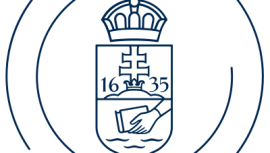Partners

UoP
University of Patras The University of Patras was founded in the city of Patras in 1964 and it began functioning in the Academic year 1966-67. The University of Patras supports the research activities of its members through a centralized infrastructure and scholarships/grants from its own resources. Simultaneously, the University offers specialized laboratory and consulting services upon contracts with public or private sector organizations and companies. It operates over 23,7M Euro research funds with >1598 researchers

ELTE
A university with an excellent reputation “Eötvös Loránd University” (shortly: “ELTE”), the legal predecessor of which was founded in 1635, is one of the oldest universities in Hungary. It has an excellent reputation both in Hungary and abroad for the quality of its educational and research programmes. The University has always received international students.
Eötvös Loránd University is one of the largest universities in the country with a total number of around 30,000 students a year and nearly 4000 teachers and staff. The university offers training at all levels of higher education. Due to the institutional mergers in 2000 and 2003, now ELTE has eight faculties (Education and Psychology; Primary and Pre- School Education; Special Education; Social Sciences; Humanities; Informatics; Law and Political Science; and Natural Sciences), 38 bachelor’s degree programs, 96 master’s degree programs, 219 combined undergraduate-graduate teaching degree programs, 8 teacher training schools and kindergartens, 3 nationally renowned teacher training schools, more than 60 degree programs in foreign languages in more than 100 buildings scattered about Budapest and Szombathely.

VIKO
Vilniaus kolegija/University of Applied Sciences (VIKO) is the largest accredited higher professional education institution in Lithuania, which was founded in 2000 merging 8 schools of higher education. VIKO has 460 qualified educators, 60 of whom are Doctors of Science (PhD) and around 6700 students on 45 study programmes in 7 faculties: Electronics and Informatics, Economics, Business Management, Health Care, Pedagogic, Arts and Creative Technologies and Agrotechnologies. Six study programmes are carried out in English. The duration of full-time studies are 3 – 3,5 years. The university is the only higher education institution in Lithuania, which has been awarded with the diploma of the Knowledge Economy Forum for innovations. Apart from basic studies short-time refresher courses are offered. Every year the study programmes are being revised to respond to current social and economic requirements of labor market, the society needs.

COCEMFE
COCEMFE is a Spanish representative NGO of persons with physical & organic disabilities, founded in 1980, that pursues their full inclusion and active participation in all areas of society, through the promotion, defence and claim of their rights, as well as the coordination, representation and impulse of its Associative Movement, thus contributing to the construction of an inclusive and diverse society. COCEMFE is made up of 91 organizations (16 Regional Confederations, 38 Provincial Federations, 37 National Organizations), covering the entire national territory and encompassing the main chronic disease organizations. COCEMFE groups together more than 1.600 associations and represents 2,5 million people with disabilities in Spain. During the 40 years of activity of COCEMFE, it has managed a large set of services that group together the activities directly aimed at satisfying the needs and expectations of our main stakeholders, the confederated entities and the people with physical and organic disabilities, according to its mission, vision and values.

IERFOP
I.E.R.F.O.P. Onlus (European Institute for Research, Training and Vocational Guidance) is a nonprofit VET institution founded in 1988, by the will of the main associations representing all the disabilities (blind, deaf, physical disabled etc.). The Institute has progressively expanded its training and education provision in different areas and for different categories of users, and it is committed to the constant improvement of educational processes. The primary goal of the organisation is the integration and reintegration of disadvantaged groups (mainly disabled people) into the labour market, through guidance and training aimed at facilitating the socio-economic autonomy and integration of disabled people (but not only), by supporting their access to education.






